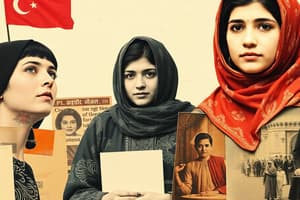Podcast
Questions and Answers
Given the cultural context described, what complex interplay of factors led to the unexpected nature of Benazir Bhutto's assassination, considering the Pashtunwali code?
Given the cultural context described, what complex interplay of factors led to the unexpected nature of Benazir Bhutto's assassination, considering the Pashtunwali code?
- The expectation of protection for women was primarily based on historical precedents of tribal warfare, which did not account for the unprecedented scale and ideological fanaticism of modern terrorist organizations operating outside traditional tribal structures.
- The terrorists strategically exploited a loophole in the Pashtunwali code related to female political figures deemed to be acting against the interests of traditional society, thereby circumventing the prohibition against killing women.
- The Pashtunwali code explicitly prohibits the killing of women, offering absolute protection regardless of political affiliation or perceived threats, leading to a complete misjudgment of the terrorists' willingness to violate cultural norms.
- The general understanding of the Pashtunwali code's protection of women was naively overestimated, while the terrorists' interpretation of Islamic law prioritized perceived apostasy and political opposition over adherence to tribal customs. (correct)
How does the author's internal monologue, 'Why don't you go there and fight for women's rights? Fight to make Pakistan a better place?' reflect a nascent understanding of agency within a restrictive societal framework?
How does the author's internal monologue, 'Why don't you go there and fight for women's rights? Fight to make Pakistan a better place?' reflect a nascent understanding of agency within a restrictive societal framework?
- It is a naive expression of childhood idealism, devoid of any concrete plan or strategic consideration of the systemic challenges inherent in advocating for women's rights in Pakistan.
- It represents a straightforward aspiration to emulate Benazir Bhutto's political career, demonstrating a clear understanding of the pathways to social change within the existing political system.
- It symbolizes an emerging recognition of personal responsibility and potential influence, juxtaposed against the backdrop of fear and violence, hinting at a subconscious resolve to subvert established power dynamics. (correct)
- It indicates a calculated decision to leverage media exposure for personal gain, exploiting the tragedy of Benazir Bhutto's assassination to cultivate a public image as a champion of women's rights.
Considering the author's age and socio-political context, how might her declaration, 'I will continue this journey of fighting for peace and democracy in my country,' be interpreted through the lens of developmental psychology and theories of moral reasoning?
Considering the author's age and socio-political context, how might her declaration, 'I will continue this journey of fighting for peace and democracy in my country,' be interpreted through the lens of developmental psychology and theories of moral reasoning?
- It signifies the formation of a personal identity predicated on moral conviction and a nascent sense of civic duty, influenced by observational learning and the desire for social approval. (correct)
- It represents a precocious but ultimately superficial adoption of adult rhetoric, lacking genuine commitment or a thorough grasp of the complexities of political activism.
- It embodies an uncritical acceptance of dominant cultural narratives regarding peace and democracy, indicative of conformity to societal expectations and a desire to avoid social ostracism.
- It is a sophisticated articulation of abstract principles of justice and human rights, reflecting advanced moral reasoning and a comprehensive understanding of political systems.
Given the historical and cultural backdrop, how does the juxtaposition of personal vulnerability ('Children who worked in the trash heap. Not even children like me who just wanted to go to school.') with burgeoning political consciousness ('I will continue this journey of fighting for peace and democracy in my country.') highlight the complexities of agency in conflict zones?
Given the historical and cultural backdrop, how does the juxtaposition of personal vulnerability ('Children who worked in the trash heap. Not even children like me who just wanted to go to school.') with burgeoning political consciousness ('I will continue this journey of fighting for peace and democracy in my country.') highlight the complexities of agency in conflict zones?
In light of the Pashtunwali code's prohibition against killing women, what nuanced socio-political implications arise from the terrorists' violation of this code in the assassination of Benazir Bhutto?
In light of the Pashtunwali code's prohibition against killing women, what nuanced socio-political implications arise from the terrorists' violation of this code in the assassination of Benazir Bhutto?
How might the author's act of keeping her burgeoning political ambitions ('I will continue this journey of fighting for peace and democracy in my country') secret be interpreted within the context of post-colonial studies and resistance theory?
How might the author's act of keeping her burgeoning political ambitions ('I will continue this journey of fighting for peace and democracy in my country') secret be interpreted within the context of post-colonial studies and resistance theory?
Considering the author's statement, 'If Benazir Bhutto can die, no one is safe,' how does this perception influence the psychological landscape of activism, specifically concerning risk assessment and mitigation strategies for dissidents in conflict zones?
Considering the author's statement, 'If Benazir Bhutto can die, no one is safe,' how does this perception influence the psychological landscape of activism, specifically concerning risk assessment and mitigation strategies for dissidents in conflict zones?
Given the limited agency afforded to women in the author's cultural context, how transformative is her decision to perceive Benazir Bhutto as a role model, and what does this choice suggest about the potential for transgressive social change?
Given the limited agency afforded to women in the author's cultural context, how transformative is her decision to perceive Benazir Bhutto as a role model, and what does this choice suggest about the potential for transgressive social change?
How can we deconstruct the author's statement, 'Everyone knew it was dangerous for her to return, but we hoped for her safety,' to reveal the complex interplay between rational risk assessment and emotional investment in political leadership within conflict-ridden societies?
How can we deconstruct the author's statement, 'Everyone knew it was dangerous for her to return, but we hoped for her safety,' to reveal the complex interplay between rational risk assessment and emotional investment in political leadership within conflict-ridden societies?
Considering the narrative arc of the story, how does the author's initial shock and stillness following Benazir Bhutto's assassination serve as a rhetorical device to underscore the transition from passive observer to active agent of social change?
Considering the narrative arc of the story, how does the author's initial shock and stillness following Benazir Bhutto's assassination serve as a rhetorical device to underscore the transition from passive observer to active agent of social change?
Flashcards
Benazir Bhutto
Benazir Bhutto
First woman Prime Minister of Pakistan, faced terrorism.
Role model
Role model
A person looked up to for inspiration and courage.
Extremism
Extremism
Radical beliefs that often lead to violence.
Women’s rights
Women’s rights
Signup and view all the flashcards
Pakistan
Pakistan
Signup and view all the flashcards
Pashtunwali code
Pashtunwali code
Signup and view all the flashcards
Child labor
Child labor
Signup and view all the flashcards
Democracy
Democracy
Signup and view all the flashcards
Militancy
Militancy
Signup and view all the flashcards
Courage
Courage
Signup and view all the flashcards
Study Notes
Malala Yousafzai's Experiences
- Malala was a role model for girls, advocating against terrorists.
- Her family watched her on TV when she spoke out against terrorists.
- She was a politician in Pakistan.
- Her family was scared for her safety because of her activism.
- She was shot by the Taliban for speaking out.
- This happened on live television in front of her family.
- Her family were shocked by her assassination attempt.
- Her assassination attempt highlighted the danger and vulnerability to women in Pakistan.
- The killing of women is forbidden under Pashtunwali code.
- Malala, despite her fear, was committed to advocating for peace and democracy in Pakistan.
- She continued her activism even after the attack.
- Malala's experiences underscore the violence and threats to female activists in Pakistan.
Malala Yousafzai's activism
- Malala advocated for girls' education, interviewed on TV.
- She worked with News Channels for girls' education.
- Malala had courage and fought for her rights.
- She was a source of inspiration to many.
- Her courage inspired others to fight for change.
- Malala's experiences were dangerous and her safety was at risk.
- She knew that her safety and the safety of others were at risk.
Studying That Suits You
Use AI to generate personalized quizzes and flashcards to suit your learning preferences.
Description
Explore Malala Yousafzai's courageous journey as an advocate for girls' education in Pakistan. Despite facing threats and violence, including a targeted assassination attempt by the Taliban, Malala persisted in her activism, highlighting the dangers faced by female activists and her unwavering commitment to peace and democracy.




